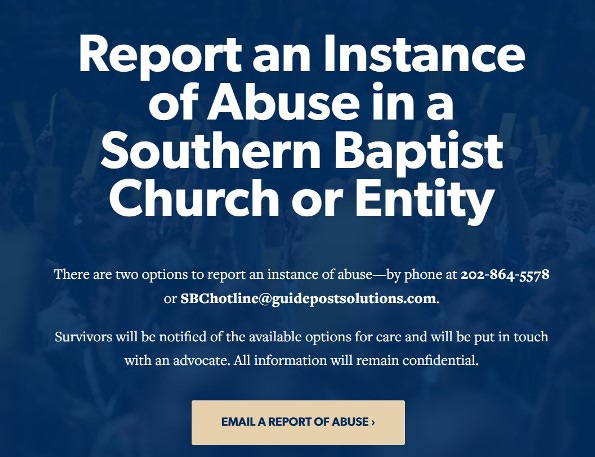About that SBC Sexual Abuse Hotline
What's true, what's not, and why can't they just be transparent?
Still front and center on its website, the Southern Baptist Convention promotes its problematic sexual abuse hotline by claiming that survivors “will be put in touch with an advocate.”
“Will be.” As though it’s a protocol.
But is it true—that survivors “will be put in touch with an advocate”? Or is it just more phony SBC hype?
Guidepost Solutions is the company that actually operates the hotline through a contract with the SBC Executive Committee. In January 2023, eight months after creation of the hotline, Guidepost issued a formal statement, insisting that, out of hundreds of hotline reports, there had been only two instances when hotline callers were referred to an advocate. Further, it claimed those two instances were at the very inception of the hotline, suggesting that it hadn’t happened since then.
So, which is it? Placing the Guidepost statement side-by-side with the SBC’s website statement, I find them hard to reconcile.
What’s true and what’s not?
If Guidepost’s statement is true—i.e., that there have been only two instances when they put a survivor in touch with an advocate & both were over a year ago—then why does the SBC still claim on its website that survivors “will be put in touch with an advocate?”
Is the SBC telling people that survivors will be put in touch with an advocate when the reality is that this almost never happens?
Or… if the SBC’s website statement is what’s true—i.e., if hotline callers “will be put in touch with an advocate”—then WHO is the advocate that they’re putting survivors in touch with?
And why don’t they just say who it is up-front?
Is the advocate someone who is aligned in some way with the SBC or is it someone wholly independent? What are the credentials and training of the advocate? Who is paying the advocate?
And again… why don’t they just tell us all this up-front?
Of course, this isn’t the only befuddlement associated with the hotline. I wrote about other concerns here—what we know and don’t know about the hotline.
Suffice it to say that transparency has never been the SBC’s strong suit, and the hotline is no exception.
Even though hundreds of reports have been made to the hotline—they’ve told us this much—we still know nothing at all about who those reported pastors are. Nor do we know whether congregants in the reported pastors’ churches have been fully informed.
Even if SBC officials don’t want to name names, they could still provide other information. How many independent investigations, if any, have been initiated based on hotline calls? How many reported pastors, if any, have been placed on leave pending investigation?
Why aren’t SBC officials providing this kind of information about the hotline? Why aren’t they doing it all on their own, transparently and up-front?
What we do know is that, in sixteen months’ time, no abusive pastors’ names have been added to a database—not even pastors with criminal convictions. Not a single one. So, the hotline has not yet resulted in the institutional outing of any sexually abusive SBC pastors.
So, what exactly is happening with the hotline? I don’t know. Heck, I can’t even figure out why they call it a “hotline” since a call to it doesn’t trigger any urgent action.
Eight months ago, in a column for Baptist News Global, I wrote this:
“The hotline appears to be more of a theater piece, presenting an illusion of accountability and care, but without the reality.”
That’s still the way it looks to me.





My guess is that whenever a survivor makes a report to the Hotline, the SBC uses that info to covertly re-traumatise that survivor so that the survivor will be silenced again.
In other words, I think the Hotline would be better called a Hitline.
This is absolutely infuriating.